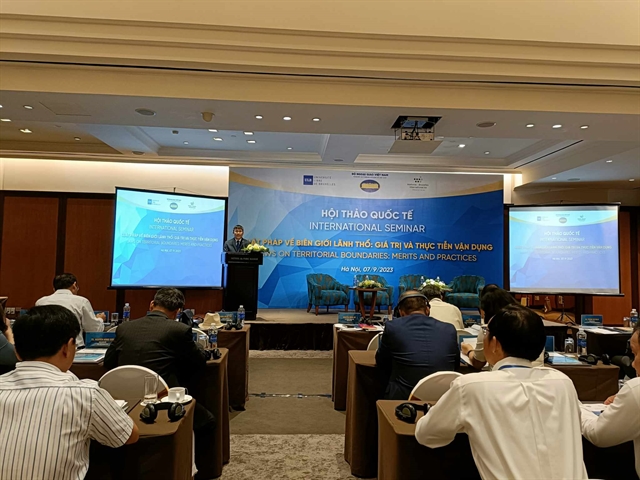 Politics & Law
Politics & Law


|
| Permanent Deputy Minister of Foreign Affairs Nguyễn Minh Vũ delivers a speech at the seminar on territorial boundary laws on Thursday. VNS Photo Khánh Linh |
HÀ NỘI — Permanent Deputy Minister of Foreign Affairs Nguyễn Minh Vũ said Việt Nam always respected and applied the provisions of international law in the process of settling border and territorial disputes with neighbouring countries.
Speaking at a seminar on territorial boundary laws yesterday, he also reaffirmed Việt Nam’s consistent policy to resolve all international disputes through peaceful means.
The seminar, which was jointly organised by the Ministry of Foreign Affairs and the Wallonia-Brussels delegation in Việt Nam, commemorated the 20th year of Việt Nam's issuance of the Law on National Borders and the 10th year of the Law of the Sea of Việt Nam coming into effect.
Vũ said that as a coastal nation, Việt Nam shared land borders with some neighbouring countries while also having maritime borders with others.
He stressed Việt Nam's consistent stance on the importance of international law in addressing territorial and border issues, as well as building and strengthening the national legal system to ensure compatibility between national and international laws.
Vũ noted that Việt Nam has successfully completed land border demarcation and reached significant agreements on land border management with China and Laos. Important milestones have also been achieved in the process of land border demarcation with Cambodia.
Regarding maritime borders, Việt Nam has successfully negotiated and signed agreements on maritime delimitation with neighbouring countries, including the delimitation of the Gulf of Tonkin between Việt Nam and China, the delimitation of economic exclusive zones and continental shelves with Thailand, and the delimitation of the continental shelves with Indonesia.
Việt Nam has also reached agreements on joint exploitation and the submission of extended continental shelf boundaries with Malaysia.
In the future, he said, Việt Nam would continue its efforts to resolve remaining areas of difference to finalise land border demarcation while persisting in its peaceful efforts to resolve disputes in the East Sea (internationally known as the South China Sea).
Vũ added that the valuable experience of other countries, including European nations, in resolving territorial disputes would serve as a valuable lesson for Việt Nam to continue its efforts and commitments to achieving peaceful resolutions in accordance with international law, including the United Nations Convention on the Law of the Sea (UNCLOS) of 1982.
Major General Hoàng Hữu Chiến of the Ministry of National Defence’s Border Guard Command highlighted the significant role of the Law on National Borders in Việt Nam's efforts to construct, manage, and protect its national sovereignty, territory, and borders.
In the realm of national border management and protection, this law has facilitated the signing of seven legal documents pertaining to borders and the demarcation of more than 5,000 boundary markers. These legal foundations support the border guards and relevant authorities in overseeing more than 200 land and sea border crossings.
Furthermore, with the aid of the Law on National Borders, Việt Nam has established 15 coastal economic zones and 26 border economic zones on its land borders. Currently, there are 267 industrial clusters operating in border areas, accounting for 36.6 per cent of the nation's total industrial clusters.
Nearly 300 economic development projects have been implemented in border regions, along with over 200 models aimed at sustainable poverty reduction and reducing regional disparities.
Chiến suggested that in the future, it was essential to continue safeguarding the national borders while integrating efforts to eradicate poverty and develop infrastructure in border regions, in addition to implementing priority policies for these areas.
He also emphasised the importance of enhancing international cooperation in defence and border security with neighbouring countries, strengthening connections between local communities on both sides of the border, and refining the legal framework related to border security.
These actions would contribute to building a robust legal foundation to enhance the capacity to protect national sovereignty and territorial integrity along the national borders.
Pierre Du Ville, head of the Wallonia-Brussels delegation in Việt Nam, expressed satisfaction with the cooperative outcomes between Wallonia-Brussels and Việt Nam, particularly with the National Border Commission, especially in terms of human resource development. This collaboration contributed to the fair resolution of territorial and border issues and the creation of a peaceful and stable regional and global environment.
During the roundtable discussion, participants engaged in conversations and shared insights on various topics related to the East Sea, such as territorial disputes at the International Court of Justice, the significance of baseline straight baselines surrounding offshore islands, and IUU (Illegal, Unreported, and Unregulated) fishing issues in the East Sea. — VNS




